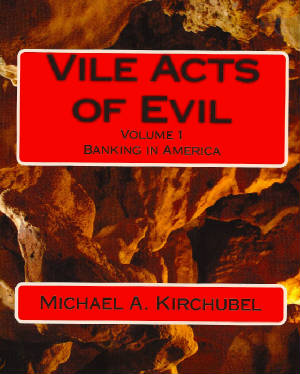The headline last Tuesday, "Regulators
proposing stricter rule for big 8 banks," makes us think that federal bank
regulators are doing a great job, policing and controlling our "too big to
fail" banks. According to the article,
bank regulators "are expected to propose Tuesday that banks increase their
ratio of equity to loans and other assets from 3 percent to 5 or 6 percent." How will this affect us here in Fairfield? The answer is simple, this won't affect
anybody, anywhere. Will these stiffer
requirements curtail bank loans and adversely affect our economy? No.
The U.S bank equity to loan ratio has traditionally been
10%, but that all changed under Republican President George W. Bush. In 2004, the bank equity requirement for
mortgage loans was reduced to 5%, and down to 2% for mortgages backed by Fannie
Mae or Freddie Mac. That was bad, but
the larger problem occurred when bankers started selling homes to less
qualified individuals, bundled their lousy home loans into enormous packages,
slapped phony-baloney AAA-ratings on them, and then sold them at top dollar to
unsuspecting pension funds. We ended-up
with a global financial melt-down that we workers of the world are still paying
for.
Two years ago in my August 22, 2011 column entitled, "Why we
have recessions," we saw that our nations' banks were, and still are, holding
almost $2 trillion in "excess reserves."
"Excess reserves" are bank assets in excess of what the bank needs to
cover their outstanding loans. With the
proposed reserve requirements increased up to 5%, those excess reserves could still
fund an additional $40 trillion in new bank loans. Since U.S bankers are swimming in reserves,
like Scrooge McDuck in his vault, there should be no monetary stringency
created by these "more rigorous" bank reserve requirements.
Until 2008, U.S. banks never had a significant amount of
"excess reserves;" bankers always considered it bad business to have money
sitting idle. But thanks to the world's largest
private bank, the Federal Reserve, bankers were given tons of dough after they
collapsed our economy and, instead of loaning out that money to the "job
creators," they bought U.S. Treasury bonds.
And thanks to the Financial Services Regulatory Relief Act of 2006,
passed by a Republican-run Congress, we American taxpayers are now paying bankers
interest on all of their reserves. They
are not only collecting interest from their vast Treasury holdings, but they get
additional, bonus interest on top of that.
Since 2007, excess bank reserves have jumped from near zero to almost $2
trillion. With interest rates now at historic
lows, the bankers' bonus check is a mere 7 billion taxpayer dollars per
year. But if interest rates should rise
to 5%, this banker welfare program will exceed $100 billion annually. All this money comes gratis from U.S.
taxpayers and the bankers reciprocate with their boundless generosity,
gratitude, and good will.
Why are taxpayers paying bankers interest? The official explanation is so that the
Federal Reserve can more easily control our nation's money supply. When our economy gets too good, and too many workers
are working, they can stifle it by raising interest rates on bankers' reserves. It's a win-win for the bankers. Traditionally, the "Fed" manipulated our
economy by simply buying Treasury Bonds to increase the money supply, or selling
them to tighten credit. Since the "Fed"
no longer needs U.S. Treasury Bonds to control our economy, they should return
the $2 trillion in bonds they recently acquired through "Quantitative Easing." The Treasury could then re-sell them and our
U.S. Government could run deficit-free for the next several years.





